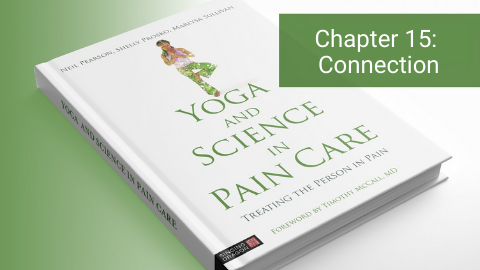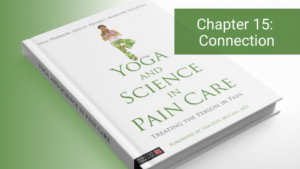

Yoga and Science in Pain Care: Book Club Webinar Series
2021-Nov-Wed @ 5:00 pm - 6:30 pm
| $39.99
Chapter 15: Connection, Meaningful Relationship and Purpose in Life – Social and Existential Concerns in Pain Care
Presenter: Marlysa Sullivan
Social and spiritual aspects of pain care are often poorly understood in both their importance and application to client/patient care. Spiritual well-being includes themes of aligning with one’s core values, meaning and purpose, and connectedness extending from the personal, to social relationships, to something more abstract or transcendent.
The philosophy of eudaimonia provides a secular perspective on these themes of spiritual well-being. Eudaimonia looks at what it means to flourish, to connect to one’s highest purpose and live a meaningful life.
Eudaimonic well-being has been used as a concept in research to discuss a steadfast contentment that comes from living in alignment with one’s values, self-actualization, authenticity, and having a sense of purpose and meaning. Research supports the many benefits of spiritual and eudaimonic well-being for pain care.
Foundational to yoga philosophy and practice are these themes of spiritual and eudaimonic well-being including that of connectedness to one’s essential nature, to others, aligning with one’s values, and a concept of purpose that supports one’s flourishing in a way that supports those around them.
These concepts of connection, meaning and purpose, and values will be discussed through the perspectives of spiritual well-being, eudaimonic well-being and yoga philosophy and practice. An evidence-informed discussion will also help to facilitate the application of these ideas in a patient/client centered manner for the benefit of a biopsychosocial spiritual well-being for pain care
Learning Objectives for Chapter 15:
- Examine the definition and importance of the spiritual domain of health for pain care from an evidence-informed perspective
- Reflect on the concept of eudaimonic well-being as a secular perspective to spiritual well-being and its importance to pain care from an evidence-informed perspective
- Examine yoga philosophies and practices that align with spiritual and eudaimonic well-being
- Apply the themes of spiritual and eudaimonic well-being to specific yoga practices for pain care from a patient/client centered perspective
What you will learn can be effectively applied via virtual and in-person consults.
To register for just for Chapter 15 with Marlysa Sullivan (facilitated by Shelly Prosko and Neil Pearson) CLICK HERE
This webinar is part of a larger webinar series. You can choose to register for individual sessions or you can register for the entire series at a discount.
The full book club webinar series consists of all 15 chapters.
Details and to sign up for the full book club webinar series (best price option) CLICK HERE.
Here is the description for the entire 15-part Book Club webinar series:
Are you looking for ways to better help people in pain? If you are, you’re not alone. It is estimated that over 1.5 billion people worldwide are affected by chronic pain. That’s 20.5% of the world population that is suffering and needs your help.
Join Neil Pearson, Shelly Prosko and Marlysa Sullivan, the co-editors of Yoga and Science in Pain Care, and 8 co-authors for the first-ever 15-part book club webinar series that will take place once per month over 15 months.
 This book club webinar series is intended for:
This book club webinar series is intended for:
- Practitioners including yoga therapists and healthcare practitioners interested in integrating yoga with their persistent pain population to expand their approaches in clinical practice
- Yoga teachers interested in understanding aspects of the science behind yoga and pain
- Medical/healthcare professionals who want to better understand pain or want to integrate yoga and mind/body practices
- Mind/body contemplative practitioners/researchers/clinicians who want to better understand the science around pain and how yoga as a mind/body practice works with people in pain
- Yoga practitioners or integrative health consumers who want an in-depth read with practical knowledge in this field.
- Yoga therapist programs and medical university/college programs that require online course study in pain care
- Schools that have online mind/body programs as stand-alone modules or as part of medical programs and other mind-body institutions.
- People suffering from pain, particularly those keen about learning some practices to help with pain self-care and who want to learn more about the value of integrating pain science and yoga
We also hope that this series will help bring together yoga therapists and health professionals. There is value in blending science and yoga therapy in pain care – for the person in pain, for the health professional, and for the yoga professional.
Learning Objectives for the Full Series:
- Describe the complexity of pain including the lived experience of pain and the science surrounding pain.
- Learn how yoga philosophy and practices can be used as an effective and evidence-informed intervention and provide a biopsychosocial-spiritual framework in pain care.
- Practice, experience and examine the application of yoga principles and practices in pain care that demonstrate addressing all aspects of the person in pain and the complex components of pain. Examples of case studies will be provided.
Important Notes:
All webinars will be recorded and made available on Embodia Academy.
**If you purchase the webinar bundle, you will be provided with complimentary access to all recordings and all resources provided during the live sessions.
Here are the links one more time:
To register for all 15 webinars and get lifetime access to the replays and ones you may have missed CLICK HERE
To register just for this Chapter 15 webinar with Marlysa Sullivan (Facilitated by Shelly Prosko & Neil Pearson) CLICK HERE
Questions? Reach out to support@embodiaapp.com
